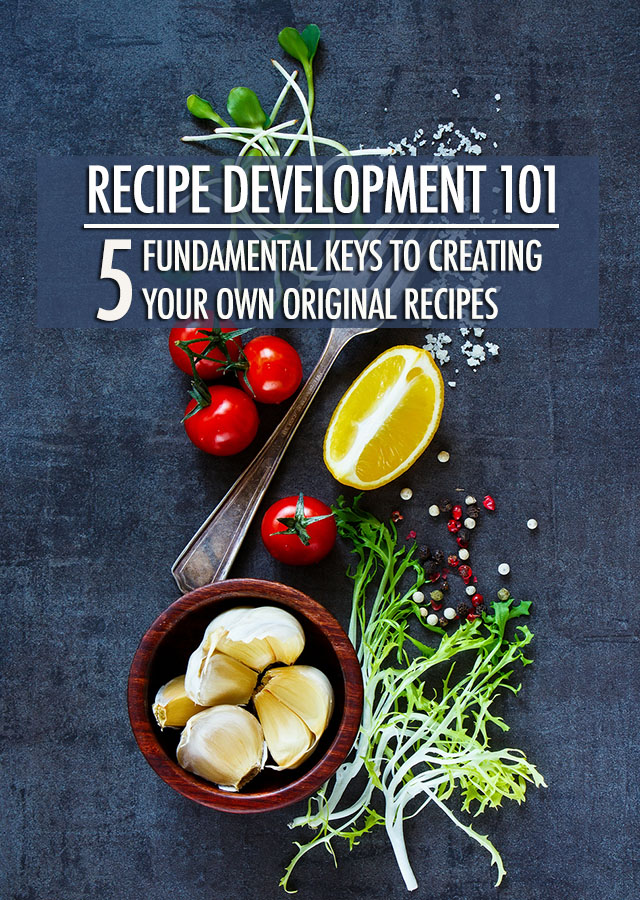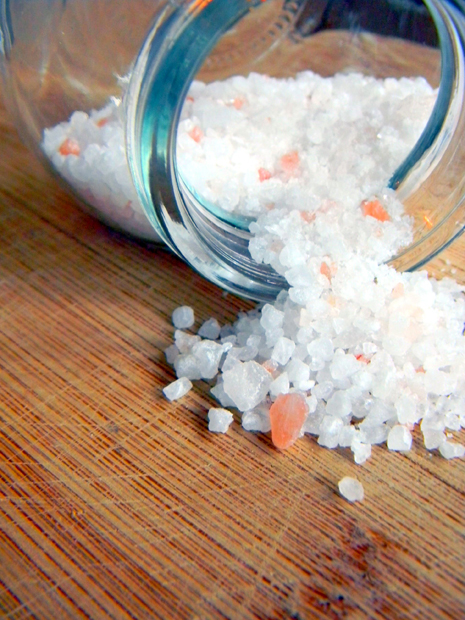How To Create Recipes For A Food Blog

I've heard many differing opinions when it comes to creating an 'original recipe'. Some say an adjustment of three (or more) ingredients to a recipe you've adapted from a blog/cookbook/magazine/etc...results in your own original recipe. Others say that you have to travel back in a time using a time machine to before a recipe was published, then put your version out first. Most people can't time travel...so...that option is out the window.

How Do You Create An Original Recipe?
My opinion would lie somewhere in the middle, while I may not necessarily agree that adapting a recipe by swapping out a few ingredients makes it totally 'brand new', I also understand that it's hard to make a dish 100% original. If creating original recipes in your kitchen is something you're interested in, but afraid to do, the most important thing, as with anything in this great culinary world, is to START SIMPLE. I wouldn't recommend popping by your local grocery store and picking up, oh, say some pork hock, an orange, eggplant, cayenne pepper and some ranch dressing, then getting home and thinking to yourself: 'Now, what should I do with this?' That probably won't end very well...

In my opinion, there are five fundamental things that really help a chef-at-home get a great start creating original recipes.
Five Fundamental Pieces To Creating A Recipe:
1. Individuals willing to become your kitchen lab rats - Having close friends or family (even a house cat if the recipe creation really goes south!) that you can sample your dishes on. For better or for worse, I am always inviting friends over for supper to taste test different inventions. I wouldn't recommend an entire meal of experiments, but sneaking in one course as a recipe 'test run' is a great way to get some feedback. Also, it helps if your friends/family are honest!

2. Learn from your mistakes - If you've always wanted to have a signature recipe of a particular dish, but it doesn't work out the first time, or second, or third, don't give up! Don't feel obligated to eat the whole thing either, but definitely don't give up! Food is meant to be experimented with and, much like other aspects of life, with successes come failures! Believe me, I have had some disastrous dishes along the way...like this really weird root beer chicken dish I made once. Don't ask.
3. Look for inspiration everywhere - For this point, I was just going to say 'read a lot of cookbooks, blogs, and all that jazz', but culinary inspiration comes from all places. A favourite cafe with amazing apple tarts, the smell of BBQ in the (dwindling) warm summer air, a spaghetti squash just begging to be roasted at the local grocery store. This may sound kind of cheesy, but all of these things that guide are senses can guide you in the kitchen too.

4. Don't use ingredients that you don't enjoy - I'm just going to out on a limb here and assume that everyone here likes olive oil and garlic, ok? If those are dislikes for anyone, you need to get over that as soon as possible, just saying! Anyway, part of sharing original recipes through your website is knowing that something works. If you're opting to use ingredients that you don't enjoy, just to impress someone or by request, or whatever the case may be, you're much less likely to want to cook it again. Everything needs a few test runs (I say three), to really become 'perfect' and who wants to cook something they don't like multiple times?
5. Know the basics - This kind of goes without saying, but knowing standard base recipes (like a basic biscuit) and general basic culinary techniques (like properly roasting garlic) are essential to recipe development. It's always great to have a solid foundation of kitchen skills. Now, I'm not talking about going out to seek some culinary training. What's nice (about the internet) nowadays (man, I sound old) is the fact that you can Google pretty much anything. Even YouTube has millions of step-by-step video tutorials. Most of your cooking-related questions can be answered by a few clicks on your keyboard!
A Basic Vinaigrette Starting Point:
Sticking with my 'know the basics' mentality, why not start experimenting with vinaigrettes? Let it be known that the standard ratio for a simple vinaigrette dressing is 2 parts oil to 1 part vinegar. Consider it a blank canvas that's already pretty oily...Now, start thinking of different ingredients that you like that can be added to the mix...Orange zest? Fresh basil? Dill? Strawberries? Jalapenos? The combinations are pretty much endless, and I haven't even mentioned the different types of oil and vinegar you could use. Add-in a touch of salt and pepper, and a chopped garlic clove or two (going back to my 'you have to like olive oil and garlic or else' theory) and you have your very own one-of-a-kind vinaigrette.
See, who knew delicious could be so simple?

More Reading:
- Cooking Exotic Food - Making Recipes Your Own
- Using a Simple Innovation Process in Recipe Development
- Recipe Development as a Profession
- Recipe Development 101: Calling a Pot of Soup Your Own
Recipe Development 101: 5 Fundamental Keys to Creating Your Own Original Recipe was written by Dan Clapson, a food writer based out of Calgary, Alberta. In addition to writing for Avenue Magazine and Food Network Canada, he blogs about his culinary adventures at www.dansgoodside.com. When he's not eating, he can be found teaching university students how to cook through his non-for-profit cooking program, Start From Scratch. He likes to eat pickles out of the jar. Twitter: @dansgoodside
Save Save
Save Save
Save Save Save Save
How To Create Recipes For A Food Blog
Source: https://www.foodbloggersofcanada.com/original-recipes-101-5-fundamental-keys-to-creating-your-own-original-recipes/
Posted by: tanneronsch1951.blogspot.com


0 Response to "How To Create Recipes For A Food Blog"
Post a Comment